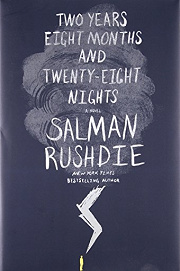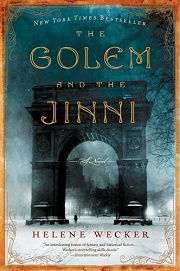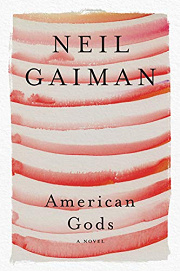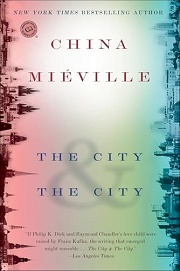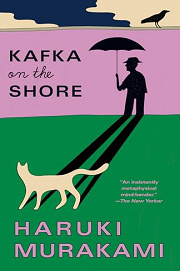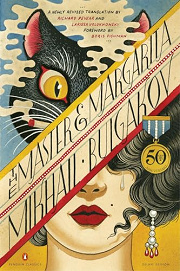Share your thoughts in a quick Shelf Talk!
Two Years Eight Months and Twenty-Eight Nights by Salman Rushdie
When a strange storm rips the veil between worlds, ancient jinn and timeless rivalries stride into the modern day. Magic, philosophy, and mischief collide as a city becomes the stage for a centuries-spanning feud. Two Years Eight Months and Twenty-Eight Nights is a luminous fable that revels in wit, wonder, and the chaos of myth made real.
Have you read this book? Share what you liked (or didn’t), and we’ll use your answers to recommend your next favorite read!
Love Two Years Eight Months and Twenty-Eight Nights but not sure what to read next?
These picks are popular with readers who enjoyed this book. Complete a quick Shelf Talk to get recommendations made just for you! Warning: possible spoilers for Two Years Eight Months and Twenty-Eight Nights below.
In Two Years Eight Months and Twenty-Eight Nights, did you enjoy ...
... jinn lore entwined with New York life, where ancient beings navigate immigrant streets and identities?
The Golem and the Jinni by Helene Wecker
If the way Dunia’s jinn lineage slips into present-day New York—through those torn “slits” between worlds and the ensuing Strangeness—hooked you, you’ll love how The Golem and the Jinni plants Ahmad (a jinni) and Chava (a golem) in 1890s Manhattan. Like Mr. Geronimo hovering inches above the pavement while trying to keep life normal, Ahmad and Chava try to pass amid Little Syria’s coffeehouses and the Lower East Side’s tenements. Their mythic backstories collide with human desires, secrets, and faith, echoing the jinn war’s blend of wonder, peril, and yearning.
... mythic beings waging secret wars in contemporary America, hidden in plain sight?
American Gods by Neil Gaiman
You enjoyed how Rushdie let jinn generals and tricksters invade our world—the Strangeness, the lightning-marked descendants of Dunia, Mr. Geronimo’s unwanted levitation—while most people carried on. In American Gods, Shadow falls in with Mr. Wednesday and discovers Old Gods hustling for belief against New Gods of media and tech. Roadside carnivals, the House on the Rock, and coin-flip miracles mirror the sly, street-level magic of the jinn slipping through to Manhattan. It’s that same sense of the epic erupting beneath everyday asphalt.
... a fantastical city used to interrogate how belief and perception construct reality?
The City & The City by China Miéville
If the debates between Ibn Rushd (Averroes) and Al-Ghazali—reason versus revelation, and who gets to define truth—fascinated you amid the jinn war, The City & the City turns that tension into a whole metropolis. Inspector Borlú investigates a murder across Besźel and Ul Qoma, twin cities occupying the same space whose citizens must “unsee” each other—or face Breach. It’s a gripping mystery that, like Rushdie’s philosophical set pieces, asks how agreements of faith and habit make worlds as surely as any jinn’s spell.
... dreamlike incursions of the uncanny into ordinary life that bend logic, time, and fate?
Kafka on the Shore by Haruki Murakami
Rushdie’s Strangeness—people who can’t sleep, gravity-defying gardeners, and rips between realms where jinn stride through—has that heady, dream-suffused feel. In Kafka on the Shore, fish rain from the sky, cats talk, and an ‘entrance stone’ opens passages as elusive as the slits Dunia’s kin exploit. As Kafka and Nakata wander through overlapping realities, you get the same surreal shimmer that made the jinn war feel like a fable spilling into the sidewalk.
... irreverent, city-toppling satire where the supernatural exposes hypocrisy and power?
The Master and Margarita by Mikhail Bulgakov
If you relished Rushdie’s mischievous jinn—grand ifrits and tricksters whose pranks and battles lampoon philosophers, politicians, and pundits—The Master and Margarita brings that gleeful bite to Soviet Moscow. Woland (the Devil) and his unruly retinue crash literary salons and stage a riotous “black magic” show, skewering pretension much as the jinn war upends New York’s certainties. It’s sharp, funny, and subversive, with the same audacious blend of the miraculous and the satirical you loved in Dunia’s campaign.
Unlock your personalized book recommendations! Just take a quick Shelf Talk for Two Years Eight Months and Twenty-Eight Nights by Salman Rushdie. It’s only a few questions and takes less than a minute.
